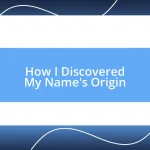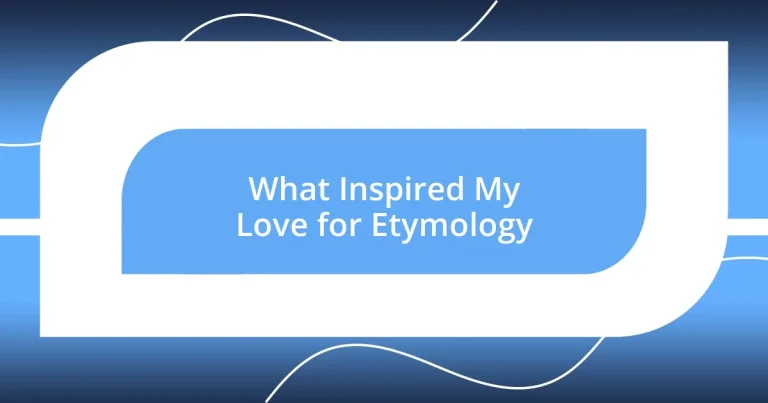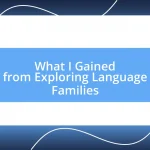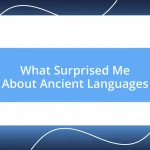Key takeaways:
- Early exposure to storytelling and street signs ignited a lifelong passion for language and etymology.
- Discovering word origins, like “quintessential” and “whiskey,” transformed words into cultural artifacts and sparked engaging discussions with friends.
- Resources like online dictionaries, books, and podcasts enrich the exploration of etymology, making language a shared journey of discovery.
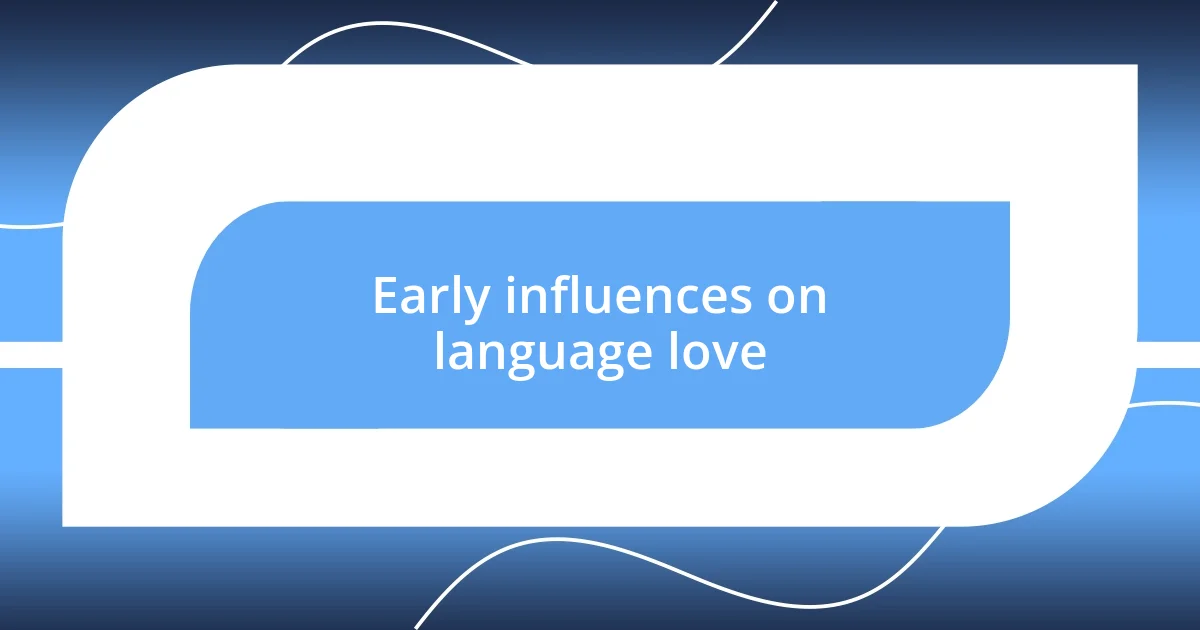
Early influences on language love
One of my earliest memories of falling in love with language comes from my grandmother’s captivating bedtime stories. She didn’t just tell the tales; she painted vivid pictures with her words, and I remember being completely enthralled by the rhythm and melody of her voice. Can you recall a moment when a story whisked you away to another world?
Another significant influence was my fascination with street signs and advertisements as a child. Instead of just reading them, I often pondered where they originated and what they meant in different contexts. Why did the same word seem to evoke diverse emotions depending on where it was placed? This curiosity opened a door to the rich tapestry of etymology that would later define my passion.
In school, my love for language deepened with every new word I learned. I vividly remember the thrill of mastering a particularly complex vocabulary word and then using it in my writing. There’s something magical about how a single word can encapsulate an entire feeling or thought, isn’t there? Each word felt like a small treasure, waiting to be discovered and shared.
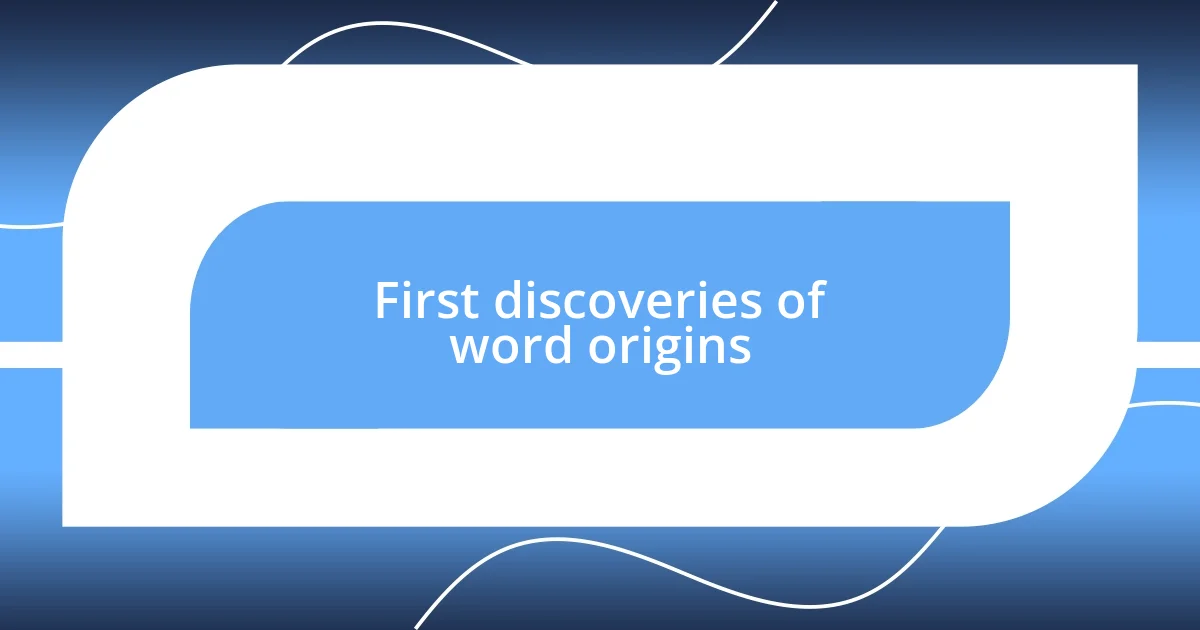
First discoveries of word origins
The first time I stumbled upon a word’s origin, it was a lightbulb moment for me. I was reading a book where the word “quintessential” popped up. Curious about its meaning, I looked it up and found it stemmed from the Latin “quintessentia.” I felt a spark ignite within me, realizing that understanding words also meant diving into a history rich with culture and nuance. Suddenly, words weren’t just random combinations of letters; they were storytelling artifacts from across time.
As I ventured further into the realm of etymology, it was like unearthing a hidden treasure trove. I recall the excitement of discovering that the word “whiskey” comes from the Gaelic phrase “uisce beatha,” meaning “water of life.” Imagine my delight at realizing that every sip of my favorite drink was steeped in language and history! This blend of language and culture fascinated me, making me appreciate how interconnected we all are through our words.
At times, I found myself engrossed in conversations about language origins with friends, often losing track of time. The way “sincere” can be traced back to the Latin “sincerus” meant so much more than just being honest; it encapsulates the idea of purity! These discussions brought forth a sense of camaraderie that made discovering word origins a shared journey, not just a solitary pursuit.
| Word | Origin |
|---|---|
| Quintessential | From Latin “quintessentia” |
| Whiskey | From Gaelic “uisce beatha” |
| Sincere | From Latin “sincerus” |
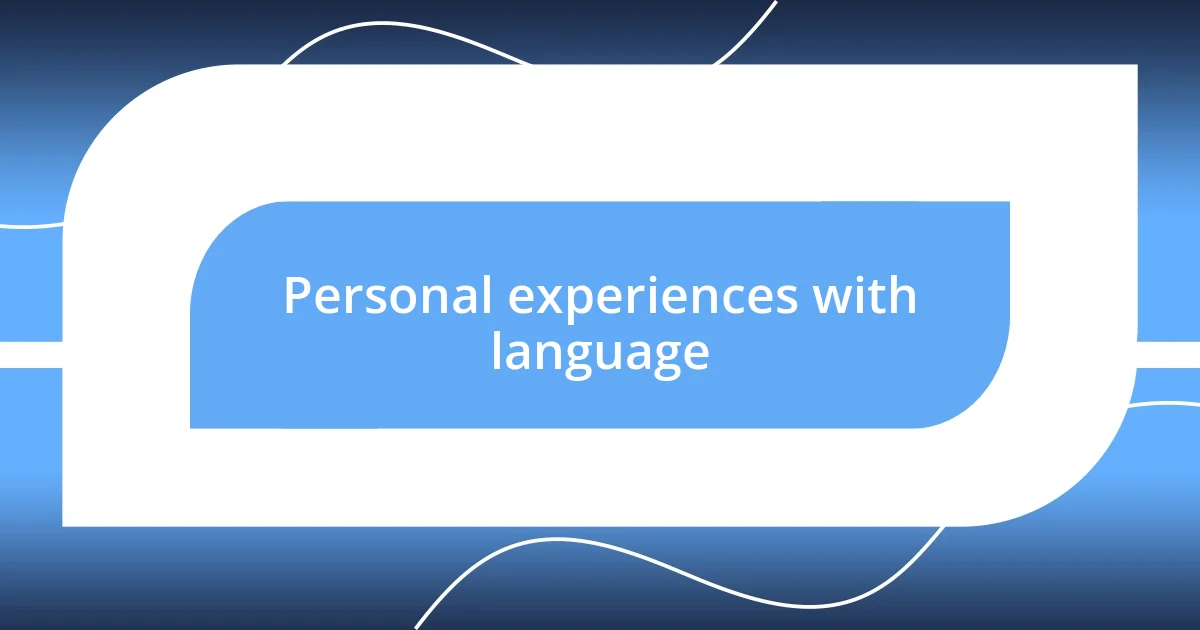
Personal experiences with language
I will always cherish the moments spent with my father as we indulged in crossword puzzles on lazy Sunday afternoons. It became a ritual for us, where every clue was a mini-adventure. I remember vividly the joy swelling in my chest when I cracked a difficult word. Those little victories instilled in me not just a love for vocabulary but an appreciation for its puzzles. I still find joy in challenging myself with new words today.
- Each puzzle came with its own set of challenges, teaching me patience and the thrill of discovery.
- I felt a rush of excitement when I found a synonym for a word I thought was unique—markedly, it felt like unearthing a delightful secret.
- It was during these sessions that I learned that some words have layered meanings, a complexity that made our conversations richer.
I also recall a moment in high school when I stumbled upon the word “serendipity” while studying for a literature exam. It struck me not only because of its delightful meaning, but also due to its exotic sound. I shared the discovery with my classmates, and to my surprise, we spent the next hour discussing the fascinating nature of lucky coincidences in our lives. Interacting with my peers this way added a layer of connection I hadn’t anticipated, transforming language into a communal exploration. Each anecdote breathed life into vocabulary, inviting us all to see words as gateways to experiences and shared memories.
- The word quickly became a favorite among my friends, symbolizing our unexpected adventures.
- Our laughter over countless “serendipitous” moments forged stronger friendships and a shared love for language.
- It ignited an enthusiasm that turned our mundane classroom into a vibrant hub of discovery and fun.
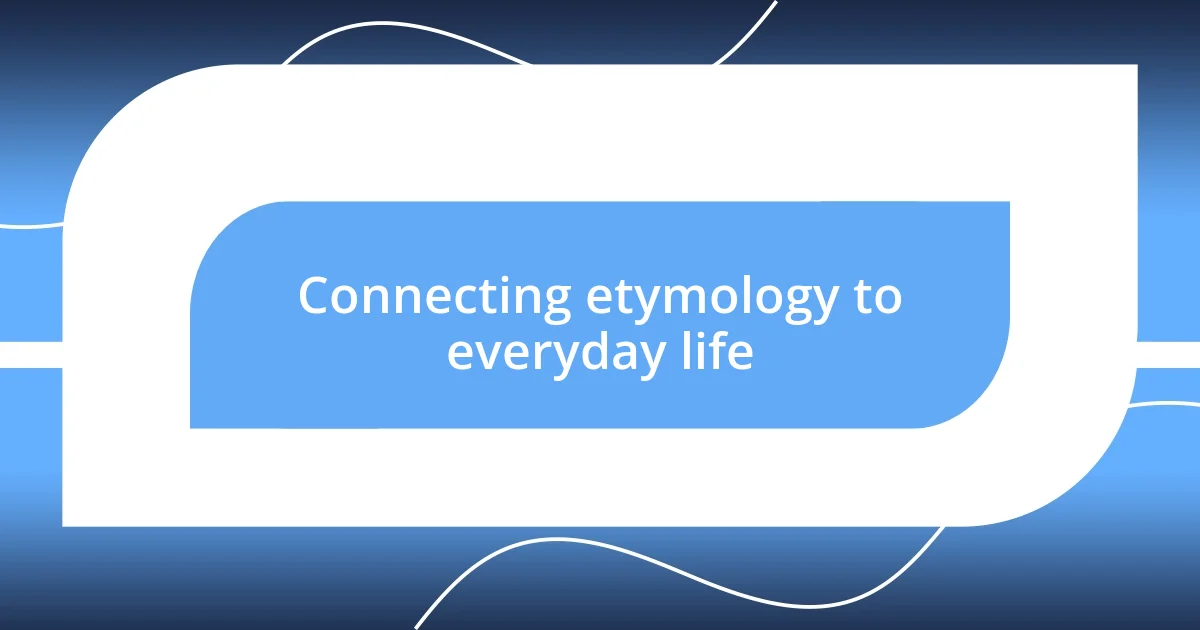
Connecting etymology to everyday life
Exploring etymology has a way of creeping into our daily conversations, often in the most unexpected moments. I once noticed how many casual expressions come from fascinating historical contexts. For instance, when I learned that “the whole nine yards” might refer to the amount of fabric needed to make a suit, I couldn’t help but bring it up during a discussion about fashion trends at a gathering. Everyone seemed intrigued, and suddenly our conversation had depth, unveiling how language reflects aspects of our lives that we often overlook.
Another memorable instance occurred during a casual dinner one evening with friends. Out of nowhere, one friend made a pun using the word “cliché,” and I felt compelled to reveal its French roots. I shared how it originally referred to the sound of a printing plate. It sparked a lively debate about other words that have changed meaning over time, reminding us how rich our communication can be when we dive into the backstory of our words. Those moments remind me that language is a living part of our cultural heritage, creating connections that go beyond mere syllables.
What really excites me is how etymology can turn a mundane word into a conversation starter. For instance, take the word “salary,” derived from the Latin “salarium,” which is related to salt. Salt was once so valuable that it was used as payment for soldiers! Sharing that nugget of history not only adds interest to everyday discussions but also highlights how deeply intertwined our lives are with the past. Have you ever thought about how understanding the origin of a word can transform the way you perceive its use? When I share these stories, I often feel like I’m inviting others into a world of discovery, making every chat an opportunity to explore and learn together.
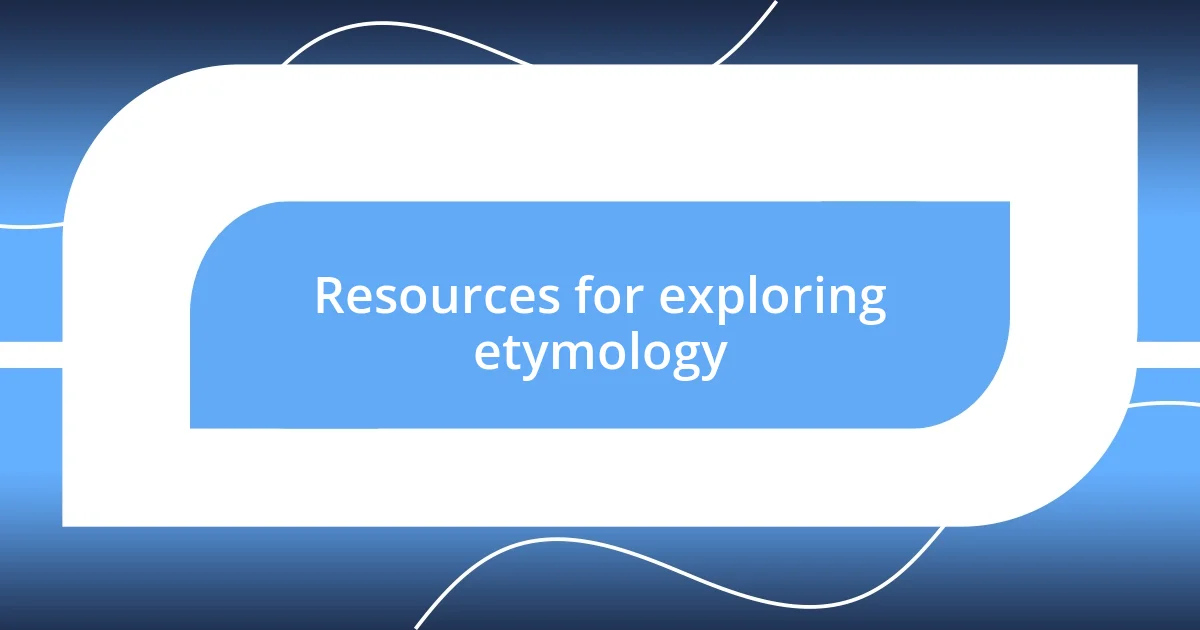
Resources for exploring etymology
Exploring etymology isn’t just a solitary journey; it can be a shared experience filled with wonder. One resource I often recommend is the online etymology dictionary, which serves as a treasure trove for anyone curious about the origins of words. I remember getting lost in its pages for hours, tracing the roots of words that I had taken for granted. Isn’t it fascinating how a simple word can reveal stories stretching back centuries?
Books on etymology also hold a special place in my heart. “Word Origins… And How We Know Them” by Anatoly Liberman opened my eyes to the methods used to study the history of words. Flipping through its pages felt like a delightful puzzle, each chapter presenting intriguing clues about language evolution. Have you ever pondered how much our understanding of a word’s past can change our appreciation for it in the present?
Podcasts and YouTube channels dedicated to language exploration can also ignite a passion for etymology. I was pleasantly surprised to discover a podcast where hosts dissected the evolution of slang, which made me see familiar terms in a whole new light. Listening while cooking or commuting has turned those mundane moments into opportunities for learning. What if a mere conversation about a trendy term could transform your understanding of language? It’s those little surprises that keep me coming back for more!


